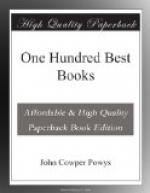Below the wit and provocative persiflage of “Intentions” there is a deep and true conception of the nature of art—a conception which might well serve as the “philosophy” of much of the most interesting and arresting of modern work.
Wilde’s extraordinary charm largely depends upon something invincibly boyish and youthful in him. His personality, as he himself says, has become almost symbolic—symbolic, that is, of a certain shameless and beautiful defiance of the world, expressed in an unconquerable insolence worthy of the very spirit of hard, brave, flagrant youth.
“The Importance of Being Earnest” is perhaps the gayest, least responsible, and most adorably witty of all English comedies; just as “Salome” is the most richly colored and smoulderingly sensual of all modern tragedies. One actually touches with one’s fingers the feasting-cups of the Tetrarch; and the passion of the daughter of Herodias hangs round one like an exotic perfume.
In “De Profundis” we sound the sea-floor of a quite open secret; the secret namely of the invincible attraction of a certain type of artist and sensualist towards the “white Christ” who came forth from the tomb where he had been laid, with precious ointments about him, by the Arimathaean.
In “The Soul of Man” another symbolic reversion displays itself—that reversion namely of the soul of the true artist towards the revolutionary organization which, along with insensitiveness and brutality, proposes to abolish ugliness also.
The name of Oscar Wilde thus becomes a name “to conjure with” and a fantastic beacon-fire to which those “oppressed and humiliated” may repair and take new heart.
90. RUDYARD KIPLING. THE JUNGLE BOOK.
Whatever one may feel about Mr. Kipling’s other work, about his rampagious imperialism, his self-conscious swashbucklerism, his pipe-clay and his journalism, his moralistic breeziness and his patronage of the “white man’s burden,” one cannot help admitting that the Jungle-Book is one of the immortal children’s tales of the world.
In spite of the somewhat priggish introduction, even here, of what might be called his Anglo-Saxon propaganda, the Jungle-Book carries one further, it almost seems, and more convincingly, into the very heart and inwards of beast-life and wood-magic, than any other work ever written. The figures of these animals are quite Biblical in their emphatic picturesqueness, and never has the romance of these spotted and striped aboriginals, in their primordial struggles for food and water, been more thrillingly conveyed. Every scene, every situation, brands itself upon the memory as perhaps nothing else in literature does except the stories in the Old Testament. The best of all children’s books—“Grimm’s Fairy Tales” itself—takes no deeper hold upon the youthful mind. Mr. Kipling’s genius which in his other work is constantly “dropping bricks” as the expressive phrase has it, and running amuck through strenuous banalities, rises in the Jungle-Book to heights of poetic and imaginative suggestion which will give him an undying position among the great writers of our race.




